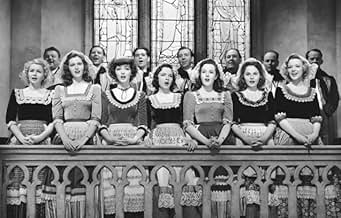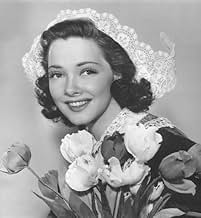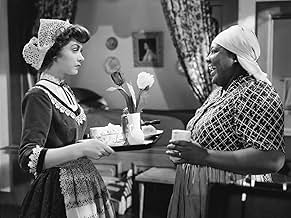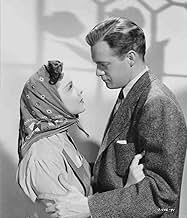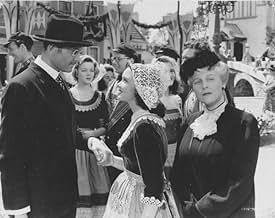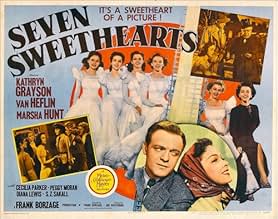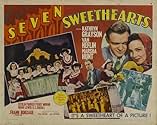Henry falls in love with Billie, one of seven daughters of an eccentric hotel owner. Billie loves him back but refuses marriage because family tradition demands that the eldest daughter must... Read allHenry falls in love with Billie, one of seven daughters of an eccentric hotel owner. Billie loves him back but refuses marriage because family tradition demands that the eldest daughter must marry first.Henry falls in love with Billie, one of seven daughters of an eccentric hotel owner. Billie loves him back but refuses marriage because family tradition demands that the eldest daughter must marry first.
- Director
- Writers
- Stars
- Director
- Writers
- All cast & crew
- Production, box office & more at IMDbPro
Featured reviews
A wonderful film to sit back and simply ENJOY---no pretense, no attempts at greatness...just a chance to escape and enjoy the world as it was once-upon-a-time in Hollywood.
This despite a few references to WWII and even the term "goosestep" used in the lyrics to "You and the Waltz", sung by Kathryn Grayson and accompanied on the piano by Carl Esmond's character. And HEY---why were those five strapping young male suitors always hanging around the hotel, instead of off fighting the war?? But...as one reviewer said, this film was meant to take the viewer away from the overseas hostilities during the very dark and turbulent year of 1942.
I would agree that Miss Grayson's singing can be a distraction, but her light, rather quivery ("tremolo" as it's called in the film), somewhat shrill and brittle sound was the taste of the day....and she WAS in fact a very capable coloratura soprano. I wish she would have sung something other than the big "Mignon" aria at the Festival's concert scene...something more in tune with the film itself, more folksy and romantic. Loved the big outdoor Festival scene (the kind which MGM always did so well), the kitschy all-girl orchestra number as dinner music, and the singing of the moving hymn "We Gather Together" in the church; it's so refreshing and touching to see the sincerity of a scene like that appearing in a mainstream film of that bygone era.
SK Szakall is wonderful in this film; a first-rate, substantial performance, requiring lots of humor, split-second timing, and some very tender pathos. Marsha Hunt is stunningly gorgeous as always, even though her role requires that she play a pain-in-the-neck.
And where did the main pair of lovers decide to settle down? One would hope that they chose to stay right there in Tulip Town.
A delightful precursor to "Brigadoon", with certain similarities to "Seven Brides", both of which MGM would be hard at work on a decade later, during the sad decline of the Hollywood musical.
This despite a few references to WWII and even the term "goosestep" used in the lyrics to "You and the Waltz", sung by Kathryn Grayson and accompanied on the piano by Carl Esmond's character. And HEY---why were those five strapping young male suitors always hanging around the hotel, instead of off fighting the war?? But...as one reviewer said, this film was meant to take the viewer away from the overseas hostilities during the very dark and turbulent year of 1942.
I would agree that Miss Grayson's singing can be a distraction, but her light, rather quivery ("tremolo" as it's called in the film), somewhat shrill and brittle sound was the taste of the day....and she WAS in fact a very capable coloratura soprano. I wish she would have sung something other than the big "Mignon" aria at the Festival's concert scene...something more in tune with the film itself, more folksy and romantic. Loved the big outdoor Festival scene (the kind which MGM always did so well), the kitschy all-girl orchestra number as dinner music, and the singing of the moving hymn "We Gather Together" in the church; it's so refreshing and touching to see the sincerity of a scene like that appearing in a mainstream film of that bygone era.
SK Szakall is wonderful in this film; a first-rate, substantial performance, requiring lots of humor, split-second timing, and some very tender pathos. Marsha Hunt is stunningly gorgeous as always, even though her role requires that she play a pain-in-the-neck.
And where did the main pair of lovers decide to settle down? One would hope that they chose to stay right there in Tulip Town.
A delightful precursor to "Brigadoon", with certain similarities to "Seven Brides", both of which MGM would be hard at work on a decade later, during the sad decline of the Hollywood musical.
Van Heflin is a roving photographer and story writer for a New York paper. He writes color pieces. He thinks he has found a suitable subject in New Delft in Michigan, where Dutch traditions survive. They are strongest in the eccentric hotel run by widowed S. Z. Sakall and his seven daughters, all of whom have boys' names. Heflin is initially annoyed by all the color, but soon falls in love with youngest daughter Kathryn Grayson. But an MGM feature needs some complications.
It's Joe Pasternak's first production for Metro, and it's his standard collection of schmaltz and sentiment under the direction of Frank Borzage -- who was getting tired of the tight rein on directors at the company. Pasternak clearly saw in Miss Grayson a chance to offer some competition to the Deanna Durbin machine he had been in charge of at Universal, and Miss Grayson gets a variety of songs to sing that show off her operatic voice. Cinematographer is in charge of lighting her, and does his usual impeccable job. It's good to see Heflin get a sympathetic lead for a change, and the usual MGM gloss is applied to a cast that includes Marsha Hunt, Cecillia Parker, Peggy Moran, Isobel Elsom, Donald Meek, and Louise Beavers. The highlight is the ensemble dance number in costume choreographed by Ernst Matray.
It's Joe Pasternak's first production for Metro, and it's his standard collection of schmaltz and sentiment under the direction of Frank Borzage -- who was getting tired of the tight rein on directors at the company. Pasternak clearly saw in Miss Grayson a chance to offer some competition to the Deanna Durbin machine he had been in charge of at Universal, and Miss Grayson gets a variety of songs to sing that show off her operatic voice. Cinematographer is in charge of lighting her, and does his usual impeccable job. It's good to see Heflin get a sympathetic lead for a change, and the usual MGM gloss is applied to a cast that includes Marsha Hunt, Cecillia Parker, Peggy Moran, Isobel Elsom, Donald Meek, and Louise Beavers. The highlight is the ensemble dance number in costume choreographed by Ernst Matray.
This wartime musical comedy is very charming, in part due to its unusual story line. Credit to director Frank Borzage and the writers for including many whimsical elements.
Songstress Kathryn Grayson plays the youngest daughter (Billie) of a Michigan family and carries the biggest load due to her vocalizing. When a New York photojournalist (Van Heflin as Henry Taggart) comes to their small town to cover the local tulip festival, he is caught off guard by the innkeeper's seven daughters, each a stunning beauty.
"Cuddles" Sakall is the father who runs his inn in an unconventional manner, but still clings to traditions. He is a lovable character with plenty of personality.
Though the story has its conflicts, it never feels heavy. This is a quirky film that is fun to watch.
Songstress Kathryn Grayson plays the youngest daughter (Billie) of a Michigan family and carries the biggest load due to her vocalizing. When a New York photojournalist (Van Heflin as Henry Taggart) comes to their small town to cover the local tulip festival, he is caught off guard by the innkeeper's seven daughters, each a stunning beauty.
"Cuddles" Sakall is the father who runs his inn in an unconventional manner, but still clings to traditions. He is a lovable character with plenty of personality.
Though the story has its conflicts, it never feels heavy. This is a quirky film that is fun to watch.
An American man from NYC arrives in a small town where Dutch people live.This is a very strange place to be ,predating Minnelli's "Brigadoon" .A place where time stood still:you do not pay when you are staying at the hotel,the girls all bear boys' name -cause dad wanted boys-and they can 't get married till the eldest does.By no means one of multi-talented Borzage's greatest achievements (most of them were behind him at the time),his movie retains freshness , a "Carpe Diem" spirit ,a good antidote to stress .My favorite scene takes place in the church.Good performances by the whole cast,particularly Van Heflin who learns to like another way of life.
"Seven Sweethearts" is about a journalist who travels to Holland, Michigan to do a story about tulip time there and falls in love. The owner of the hotel has seven young, lovely daughters, all with men's names, who live in an isolated little world of clogs and tulips. One of them is pretty Billie (Kathryn Grayson) with whom the jaded reporter falls in love. All the girls, with the exception of the ambitious, cold Reggie (Marsha Hunt) have boyfriends and are aching to get married. But tradition states that the oldest girl must marry first.
This movie seemed very long to me, strange, and somewhat boring. It's filled with B actors, with the exception of Heflin, Grayson, and character actor S.K. Sakall, who hands in one of the best acting scenes toward the end of the film when he has a confrontation with Billie. Grayson had a thin, fluttery coloratura soprano that nevertheless possessed some beautiful high notes and pianissimos, and she entertains throughout with songs and arias such as "Je suis Titania." She's good in her role. Heflin seems out of place but is quite likable.
For those who don't know, the oldest girl marrying first was and perhaps still is a tradition in many cultures. The ending is cute, but this is still a cloying film, and it's hard to believe that this family had no relatives in Holland that they were concerned about during wartime. I suppose the idea was to take everyone out of the war for a while.
This movie seemed very long to me, strange, and somewhat boring. It's filled with B actors, with the exception of Heflin, Grayson, and character actor S.K. Sakall, who hands in one of the best acting scenes toward the end of the film when he has a confrontation with Billie. Grayson had a thin, fluttery coloratura soprano that nevertheless possessed some beautiful high notes and pianissimos, and she entertains throughout with songs and arias such as "Je suis Titania." She's good in her role. Heflin seems out of place but is quite likable.
For those who don't know, the oldest girl marrying first was and perhaps still is a tradition in many cultures. The ending is cute, but this is still a cloying film, and it's hard to believe that this family had no relatives in Holland that they were concerned about during wartime. I suppose the idea was to take everyone out of the war for a while.
Did you know
- TriviaAlthough the onscreen credits say "original screenplay," a $200,000 lawsuit was filed against the screenwriters, MGM and producer Joe Pasternak by playwright Ferenc Herczeg in 1949, claiming they took the idea from his 1903 play Seven Sweethearts. Herczeg was in a Nazi concentration camp in 1942 when the film was released, and didn't hear about it until 1948. The case was settled out of court for a substantial amount.
- GoofsWhen Billie is singing to Henry, two white doves land on the windowsill. When they fly away, a string can be seen pulling on the leg of the dove on the left.
- ConnectionsFeatured in Personalities (1942)
- SoundtracksTulip Time
(1942) (uncredited)
Music by Burton Lane
Lyrics Ralph Freed
Played during the opening credits and sung by an offscreen chorus
Reprised at the tulip festival and danced by a chorus
Sung by Kathryn Grayson
Details
- Release date
- Country of origin
- Language
- Also known as
- Las siete novias
- Filming locations
- Production company
- See more company credits at IMDbPro
Box office
- Budget
- $752,000 (estimated)
- Runtime1 hour 38 minutes
- Color
- Aspect ratio
- 1.37 : 1
Contribute to this page
Suggest an edit or add missing content



